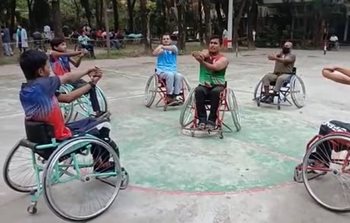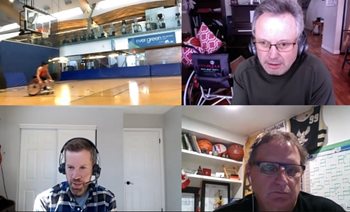 One of the first things I noticed about Joe Higgins is that he gets excited about everything. That unbridled enthusiasm has served him well throughout his 35 years of coaching wheelchair basketball.
One of the first things I noticed about Joe Higgins is that he gets excited about everything. That unbridled enthusiasm has served him well throughout his 35 years of coaching wheelchair basketball.He’s taught everyone from complete beginners to athletes playing for Team Canada. It was his enthusiasm that convinced me to join a virtual training session he was running with a few athletes from Cambodia. They happened to be some of the best female athletes in Asia as well as the coach of the Cambodian national women’s team.
The virtual training - which had me working up a very real sweat - isn’t how he usually does his work. Normally he’d be in Bangladesh, Myanmar, India, or Cambodia teaching aspiring wheelchair basketball players and coaches in person.
Joe works with the International Committee of the Red Cross on a program dedicated to encouraging social inclusion and changing the perceptions towards people with disabilities in countries affected by conflict through sport. It’s a journey that all started three and a half years ago when he met Jess Markt, Disability Sport and Inclusion Advisor for the ICRC, at a tournament in Thailand.
As the tournament progressed, Jess saw how quickly Joe was able to make an impact with his players and asked if he would ever consider coaching in countries recovering from conflict. After the tournament they had lunch and by the time it was over, Joe had committed to going to India.
“I hardly ever use the word inspiring when I talk about wheelchair sport or wheelchair basketball, because we’re all just doing what we do,” Joe said. “But when I got the opportunity to go to India, it was inspiring to watch people do whatever it takes to play the game. It was just such a unique experience.”
Joe was initially worried about the language barrier, but it proved to be an exciting opportunity to push himself to uncover new ways of teaching and, as always, his enthusiasm took care of the rest.
“I was fortunate to be given the opportunity to coach Cambodia at a tournament for a month. It really challenges you because you have to think outside the box,” Joe said. “How do you coach somebody when you don’t speak their language? Well, you teach them basketball. At the end of the month, we spoke the same language. We spoke basketball.”
 The enduring beauty of sport is that it inherently brings people together — albeit sometimes in fierce competition. It binds teammates to a common cause regardless of what might otherwise separate them. What matters is how much you can push your body to it’s limits, not what those limits are.
The enduring beauty of sport is that it inherently brings people together — albeit sometimes in fierce competition. It binds teammates to a common cause regardless of what might otherwise separate them. What matters is how much you can push your body to it’s limits, not what those limits are.“In wheelchair basketball we’re all one family. When you break your back or your neck, or you have cerebral palsy, polio, or spina bifida, the fact that you have to figure out a different way to do things makes a big difference to how important it is whether you won or lost a game,” Joe said. “It doesn’t mean you don’t want to win. It doesn’t mean you’re not super competitive. It means after the game you recognize that there’s a life balance that’s more important.”
As a coach, the ultimate reward is to see your players improve. To see the joy on their faces as they master a new technique or to fight through the frustration of not yet being able to make their bodies do what they want to them to do. For athletes with a disability this takes on an added dimension. They’re also burdened with training a society — that often sees them as inferior — to value their accomplishments.
“I’m hoping that sport can be that little bit of a kick for people to see it’s not what you can’t do, it’s what you can do. Sport has been that for me in my life and I think it can be even more for people around the world who aren’t seen as the same or equal or employable,” Joe said. “They’re more than employable. They’re great human beings. They have great skills. They’re very good problem solvers because if they weren’t, they wouldn’t be able to do what they do.”

So, when the pandemic shut down air travel Joe had a problem to solve, and he got creative. He had stayed in touch with the people he’d worked with overseas and had done some virtual trainings before from his home in British Columbia. How much harder could it be to remotely coach athletes from across the world?
“Well, it’s actually turned out to be quite easy,” Joe said. “We’ve learned how to adapt so that we can make a stationary pushing machine. If they have a camera then we can teach them. If they send us video, then we can coach then. If we have a translator, we can share with them.”
Back in my virtual training session, Joe now has us all madly spinning our wheels (mine are pretend) to Paul Simon’s Me and Julio Down by the Schoolyard as a warmup. When we move on to more practical manoeuvres, I find myself watching Joe more than the other participants. He doesn’t lead any of the drills, preferring to teach by committee and only jumping in to help reinforce a point or offer a word of encouragement. But he’s rapt with attention, completely focused on the action until it becomes too much to bear, and he lets out a ‘Whoop’ of delight when someone nails a technique.
Since my virtual training session, Joe and Jess have continued to develop and expand the program. It now includes athletes from Ethiopia, Nepal, and Afghanistan, among others, and is continuing to grow thanks to their tireless efforts.
You can find out more about how ICRC works with people who have disabilities here.
Related stories:

